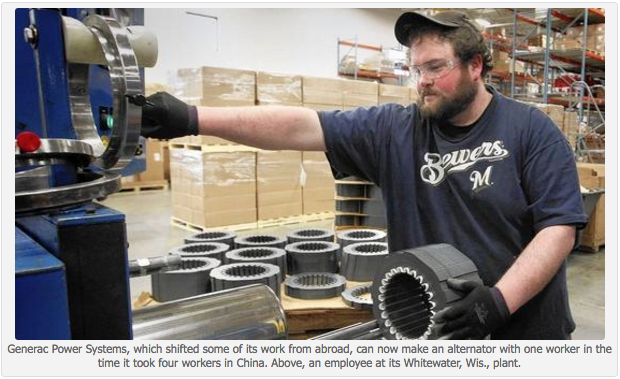The topic of a recent Washington Post article is hard to dispute: the United States is not planning ahead for the coming technological revolution to the world of employment. Certainly the subject of automation with its destructive effect on jobs is ignored or rarely mentioned in the capitol city.
There was a 2016 Senate hearing titled The Transformative Impact of Robots and Automation and another hearing the following year, Transportation Innovation: Automated Trucks and Our Nation’s Highways. Neither received the media attention deserved for the job-killing technology and the changes coming to the workplace.
Meanwhile, the tech community has hoisted a number of warning signs: Oxford researchers forecast in 2013 that nearly half of American jobs were vulnerable to machine or software replacement within 20 years. Rice University computer scientist Moshe Vardi believes that in 30 years humans will become largely obsolete, and world joblessness will reach 50 percent. The Gartner tech advising company believes that one-third of jobs will be done by machines by 2025. The consultancy firm PwC published a report last year that forecast robots could take 38 percent of US jobs by 2030. Last November the McKinsey Global Institute reported that automation “could displace up to 800 million workers — 30 percent of the global workforce — by 2030.” Forrester Research estimates that robots and artificial intelligence could eliminate nearly 25 million jobs in the United States over the next decade, but it should create nearly 15 million positions, resulting in a loss of 10 million US jobs.
Naturally it is unwise to continue immigration at current levels when jobs to support them are already disappearing. Some manufacturing has returned to the United States because of automation: use of the advanced technology means America’s higher wages are no longer determinative to where things get made.

The Washington Post article (reprinted in the SF Chronicle below) emphasizes education and retraining for the techno-future which is certainly advisable and overdue.
The United States is way behind other countries on robot ‘readiness,’ report says, by Danielle Paquette, San Francisco Chronicle, April 24, 2018
The United States lags behind other countries in readiness for an increasingly automated world, placing ninth on a ranking of 25 advanced economies, according to a new report from Swiss technology giant ABB.
South Korea, Singapore, Germany and Canada are better prepared for the rise of machines, thanks largely to their education systems and labor policies, the authors of the Automation Readiness Index concluded.
Researchers graded the nations on three main categories: their innovation environment, which included money spent on research and development; school policies, from early curriculums to lifelong learning programs, and public workforce development, such as government-led efforts to retrain workers.
No country is “genuinely ready” for the technological shift that is expected to displace millions of workers worldwide in the next three decades, they found – but the United States is especially underprepared for the jobs of the future.
Guido Jouret, ABB’s chief digital officer, singled out the U.S. educational system, which pushes students toward two or four-year degrees. Colleges tend to be less nimble when it comes to keeping up with technological changes, and companies will seek workers who can adapt to cutting-edge developments.
Germany, in contrast, encourages technical training, which is generally more reactive to immediate employer needs. Sixty percent of young adults in the country train as apprentices in manufacturing, IT, banking, construction and other fields, compared with 5 percent of Americans.
“We lack this vocational training track,” said Jouret, who works in San Francisco.
Susan Lund, a labor economist at the global consulting firm McKinsey, said U.S. students tend to feel more pressure to take the university route, even if it’s outside their budget.
“Not everyone needs a four-year college degree,” she said . ” We could do a lot to build more career pathways. Even just skill-credentialing to enable people to get a basic, entry-level job.”
(Continues)


